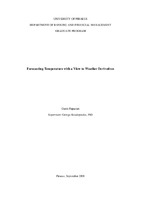Forecasting temperature with a view to weather derivatives

Master Thesis
Συγγραφέας
Papazian, Garen
Ημερομηνία
2008-09-29Προβολή/
Θεματική επικεφαλίδα
Derivative securities ; Weather derivativesΠερίληψη
The objective of this study is to obtain robust results between proposed temperature forecasting models - Campbell and Diebold (2005) and Benth and Saltyte-Benth (2005) - used as the underlying processes for valuing weather derivatives contracts, based on their performance in different locations and in different horizons. Furthermore, we propose and implement new ways - a first order autoregressive process, the principal component analysis (PCA) and the combining forecasting approach - of modeling and forecasting the temperature behavior. Finally, we attempt to dynamically forecast the two most traded weather indices in the CME market, the cumulative heating degree day (CumHDD) and the cumulative cooling degree day (CumCDD) indices. The statistical significance of these forecasts is examined using as benchmark the values produced by the “burn analysis” methodology. After examining the different forecasting models, we found that no one model was able to consistently outperform the others. The most appropriate forecasting model varied between cities and horizons. Thus, a general model that adequately explains the temperature is absent and probably not possible. However, we tried the PCA for forecasting purposes and we found that it could be a very powerful method specifically for the temperature of the U.S.A. The combining forecasting approach performed best for the temperature of Europe. The index forecasting exercise showed that the CumHDD index is more difficult to be forecasted than the CumCDD index. Quite interestingly, the European weather indices can be forecasted more adequately than those of the U.S. since the accuracy measures are significantly lower. As far as regards the second objective of this exercise, we concluded that the forecasts calculated by the naïve “burn analysis” methodology should not be rejected a priori in every case.


